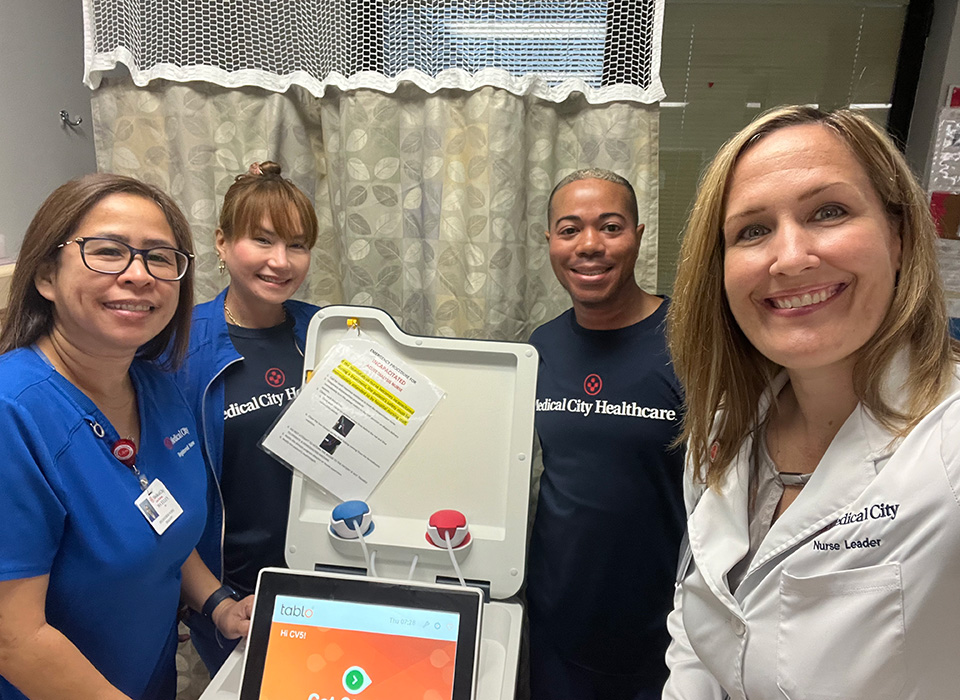Driving Quality, Reducing Cost by Insourcing Dialysis with Tablo

Summary
Learn from Krysta Myers, Division Director of Dialysis at Medical City Healthcare North Texas, how the transition to Tablo has benefited her hospital system’s patients, staff, and overall operations.
Krysta Myers is the Division Director of Dialysis at Medical City Healthcare North Texas. She oversees a float pool of nurses that provides dialysis services for 7 hospitals in this HCA Healthcare System. Recently, our SVP of Sales Laura Romike and National Clinical Director Anna Howard sat down with Krysta on an Outset-sponsored webinar to hear about her experience with the Tablo® Hemodialysis System, and to learn more about how the transition to Tablo has benefited her hospital system’s patients, staff, and overall operations.
You can see the full webinar here:
The following responses from Krysta have been lightly edited for length and readability.
What features or qualities of Tablo help you and your team to better care for your patients?
Overall, Tablo is very compact and easy to use, and it’s very user friendly. So that’s enabled us to have increased productivity, efficiency. It’s easy to train our staff on a shorter timeline, so we’re seeing numerous benefits just with that in place. The step by step instructions on the touchscreen interface is technology that we’ve needed in dialysis for some time, and it’s enabling us the opportunity to cross train nurses into dialysis from other departments, as well as giving our ICU teams the confidence to move forward with Tablo for SLED.
What are the biggest differences between an insourced and an outsourced dialysis program?
Great question. Ultimately, with outsourced programs, of course you’re contracted with a vendor. There tends to be exorbitant fees for treatment, but in addition to that treatment fee we also have numerous other fees associated with treatment duration, and treatments that the patient may need during dialysis such as blood transfusions. One other downside to having an outsourced program is lack of overall program oversight. We don’t always have consistent review of our outcomes in dialysis. And our staff that are working with the vendor are contracted, so there’s not a lot of ongoing education and alignment with hospital policy and procedure. So that can lead to an increased risk for patient safety issues, adverse events, potentially harm, and ultimately a lower level of quality outcome for our dialysis patients.
Moving to an insourced program we have in-house staff that are committed, not only to set productivity goals but also quality outcomes and metrics that are defined. And we have additional oversight and involvement from multiple stakeholders, as now we are owning that program. So it really does lead to increased quality, but also improved overall financial outcomes for the department.
What cost savings have you realized since switching to Tablo?
When it comes to analyzing our realized cost savings one year post-insourcing, we are achieving around 25% savings for labor and supplies. We have the ability to increase those savings with initiatives that we are continuing to put in place, like increased SLED utilization with Tablo in our ICU settings.
One other initiative that we are driving is a Tablo BioMed program, where we will have in-house biomed availability to help troubleshoot complications should they arise with the machine. We also see tremendous cost savings projected with that.
What is your average cost per treatment with a Tablo machine?
One great thing with the Tablo machine is your supply cost does greatly decrease. You’re looking at an average of around $55 per treatment for overall supply costs with Tablo. In comparison with your outsourced program, you are paying in excess, on average, $100 an hour for the outsourced staff that are providing that service. So you are really cutting your costs quite a bit, moving over to an insourced program, in general. In comparing the machine itself with others, you’re also seeing cost savings overall. Some of the other machines that you have an option for with dialysis are nowhere near $50 dollars. Especially if you use bagged dialysate, you’re looking well over $200 per treatment.
How does Tablo help when you’re going through a Joint Commission survey?
For those that have years of experience in dialysis, I’m sure you’re very familiar with several manual written logs. And anytime we have manual logs, we have a risk for non-compliance and a risk for human error. And Tablo really does help to improve that risk associated. Ultimately, the ability for the machine to WiFi connect and transmit treatment reports, service reports and disinfect reports, that gives you a huge insight into how the program is operating. It also gives you the ability to pull that data quickly without the worry that something will be potentially missing. So that is a main driver that really helps with overall compliance and excellent survey outcomes.
Just having that additional program oversight and involvement with an insourced program, and having internal audits to see how the staff are operating and ensuring that they’re in compliance with policies and procedures – also that we have policies and procedures for dialysis – all that really helps to improve our overall outcomes. When you see those standardized practices with an insourced program, it ultimately leads to an excellent survey outcome as well.
Dialysis is always a priority focus for Joint Commission and other surveyors. So to have that ease of mind that we have automated reports to pull with Tablo, and that we have a program with multiple stakeholders that are very committed to its outcome, it really does help us to achieve surveys without findings, ultimately, which is what we’re all looking to achieve.
I’ve been through several Joint Commission surveys. And I’m happy to say that they have gone well, overall, from the perspective of the Tablo machine. I’ve heard several comments from surveyors that they’re impressed with safety features that the machine has, and that it really does keep the patient’s safety in mind. For example, we’re all human – someone may forget to do a disinfection the previous evening. But Tablo will tell you the next morning, ‘I’m sorry, you’re going to have to do this before you move forward with patient care.’ So safety is top of mind with Tablo. And that’s something that our surveyors love to see. And those automated reports just make a world of difference with our surveys. We’re able to produce the data that needs to be reviewed quickly. And that’s always a huge plus for our surveyors. So, ultimately, it’s led to really great outcomes.
How does having Tablo help you recruit and retain dialysis staff?
With hiring and recruiting staff, it’s important to talk through the technology that you have for dialysis and also the structure of the program. The machine is great, but it’s only one component; it’s very important to build a structure that will bring the team to you, essentially. Ultimately, having physician champions that are invested in helping to create a solid structure – whether it be your orders for dialysis, your supplies for dialysis, things of that nature – is very important to help recruit and retain permanent staffing.
Additionally, it really helps to define “super users” for your program. When you’re first looking at insourcing, it’s very important to bring in some subject matter experts that can help train others and help build out that team, essentially investing in education up front. It’s very important to ensure that they’re receiving all the training that they need. And I think it’s great to have Outset’s support with that. The fact that Outset offers the Tablo Coordinators Program for super users helps to continue to provide advanced training that will enable staff to work through any troubleshooting issues that might happen with a new program. Anytime you’re making a change, it’s not always easy. So having Outset’s support with that is very critical to continue to make care improvement, and ultimately retain your team once you have hired them. And then continuing to look at initiatives as well, because there’s always an opportunity for improvement. So working through those issues that you do find, and then looking for an initiative that will help to resolve it, this just really helps to keep your team together, happy and satisfied.
Can you share a bit more about the various kinds of training and support that you received from Outset?
Absolutely. I haven’t ever encountered a company that is so involved. I’m very grateful for all the support that Outset has provided. With insourcing a program, Outset is there from day one, providing project management tools, assisting with project management calls, and really just being there from the beginning, all the way to go-live, and continuing on. When you contract with Outset Medical, you really do have a partner that is also invested in your continuous care improvement. So it really aligns with HCA Healthcare’s mission, and ultimately, with the goal of insourcing. Outset is there to support with onsite training, and they are there to support go-live to ensure that it goes smoothly. And then they’re there from a clinical support standpoint moving forward. There’s a dedicated clinical specialist to reach out to with questions or issues that might arise. There’s a dedicated service engineer for any machine breakdown. So you really do have well-rounded support with Outset.
What about with payors – was the transition from outsourcing to insourcing seamless, or were there any challenges with reimbursement?
Overall, I would say that it is pretty seamless, moving to an insourced program. Though one opportunity and lesson learned that I will bring up has to do with the charge list. Ultimately, ensuring that the charge list is fully built for an insourced program and that everybody understands that list is important. I provide ongoing education to my team on how to enter charges appropriately based on patient condition and admission status. And I think that’s really important to help prevent lack of reimbursement on the back end.
Were there any unexpected challenges during your conversion to an insourced dialysis program with Tablo?
There are always challenges with any type of change. And I will not say that this has been without challenge. Ultimately, one lesson learned with insourcing has to do with who you involve with your project management to bring your insourced program to a go-live successfully. I have found in projects where we have our trifecta – our CMO, our CNO, our COO or CFO – involved, and we dedicate a nephrologist champion to be present and involved with the creation of the program, that’s where things go smoothly. And everybody is satisfied. We build a very detailed supply list of what we will need for dialysis, we have education involved, and we really bring departments together to ensure that we’re covering all components.
And also being able to transition Tablo in at times is very helpful too. To just come across any of those bumps that may happen with a go-live, and then build upon it to the point where you do feel really confident with Tablo running 100%, and being insourced 100% as well. One other challenge that we have encountered in moving from outsourced to insourced is you do lose that technical support in a way. You have support from Outset for machine breakdowns that may happen, but it’s important to think about having your own technical support at the hospital as well for your program, such as a Tablo biomed. That really does increase staff satisfaction and retention because your nurses are able to focus more on patient care and less on filter changes for the machine, and cleaning lines, and things of that nature that are more technical. So I’d say that’s a huge learning opportunity, and one to ensure gets included in the program when insourcing. I’m really happy that Outset is offering a biomed training and certification program for that purpose, for those that are interested.

